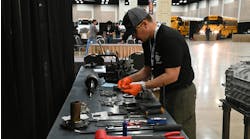As vehicles have become more advanced and high tech, the need for automotive specialty tools has grown as well. Such tools have become a necessity in order to handle the increasing complex, challenging and specialized repair and service requirements.
What’s more, new vehicle and component designs often make it difficult for technicians to access, remove or install parts and components with more general tools.
Such tasks can be accomplished much easier, quicker and with less effort when the appropriate, well-designed specialty tool is used. This helps make the technician more efficient and effective at accomplishing the job, plus it adds to the life of the tool.
In addition to saving time, money and technician effort, by employing the suitable specialty tool, technicians are less likely to damage something during the job or suffer an injury. As has been noted previously, here again, should an accident occur, the result is technician and shop downtime.
CHECKLIST
Some general key purchasing considerations:
- Design of the tool, including style, size, weight, etc.
- Ergonomics.
- Quality.
- Warranty/guaranty.
- Training resources.
- Product support.
- Brand reputation.
- Training resources.
- Budget range/price.




